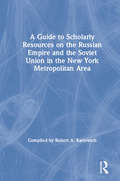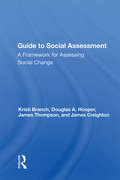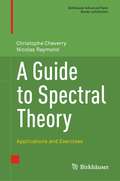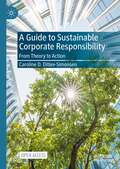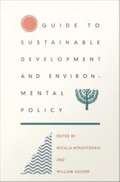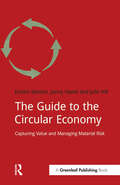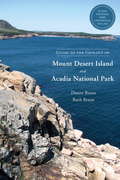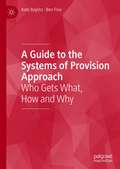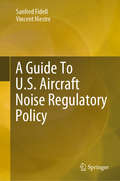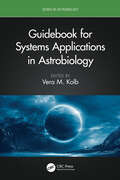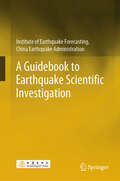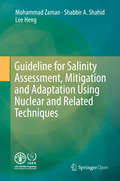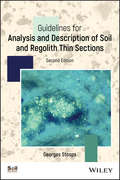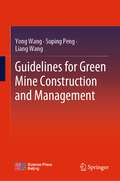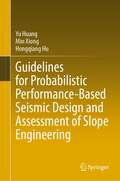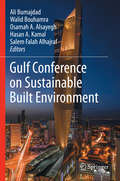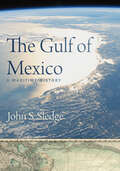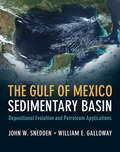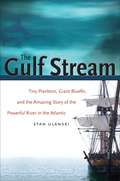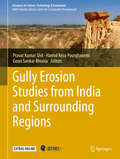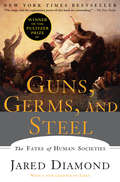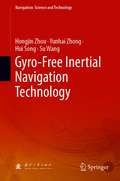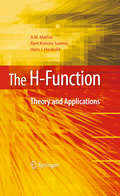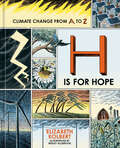- Table View
- List View
A Guide to Scholarly Resources on the Russian Empire and the Soviet Union in the New York Metropolitan Area
by Robert A. KarlowichIdentifies collections held by public and university libraries, historical societies, and other institutions, as well as private collections, with material relating to any subject and historical period, and to the widest geographical area under imperial or Soviet rule. Includes movements for example
Guide To Social Impact Assessment: A Framework For Assessing Social Change
by Kristi BranchDesigned to provide clear and detailed assistance in the complex process of assessing social change, this book emphasizes the development of an analytic approach and a theoretical framework that can be applied to the assessment of very diverse events--changes in the natural environment, the local economy, or the dominant technology. The guide, based on a sociological perspective that highlights the importance of community social organization in analyzing social change, focuses on the development of user skills in assessment design, research, analysis, and presentation. The guide's theoretical basis and emphasis on the interrelationships that create social change make it valuable to those studying social change in general, as well as to those responsible for conducting or utilizing social impact assessments. Detailed "how to" information, clear writing, and careful design impart the skills necessary to identify and analyze the factors and processes leading to social change and to interpret and present research findings in an effective manner.
A Guide to Spectral Theory: Applications and Exercises (Birkhäuser Advanced Texts Basler Lehrbücher)
by Christophe Cheverry Nicolas RaymondThis textbook provides a graduate-level introduction to the spectral theory of linear operators on Banach and Hilbert spaces, guiding readers through key components of spectral theory and its applications in quantum physics. Based on their extensive teaching experience, the authors present topics in a progressive manner so that each chapter builds on the ones preceding. Researchers and students alike will also appreciate the exploration of more advanced applications and research perspectives presented near the end of the book.Beginning with a brief introduction to the relationship between spectral theory and quantum physics, the authors go on to explore unbounded operators, analyzing closed, adjoint, and self-adjoint operators. Next, the spectrum of a closed operator is defined and the fundamental properties of Fredholm operators are introduced. The authors then develop the Grushin method to execute the spectral analysis of compact operators. The chapters that follow are devoted to examining Hille-Yoshida and Stone theorems, the spectral analysis of self-adjoint operators, and trace-class and Hilbert-Schmidt operators. The final chapter opens the discussion to several selected applications. Throughout this textbook, detailed proofs are given, and the statements are illustrated by a number of well-chosen examples. At the end, an appendix about foundational functional analysis theorems is provided to help the uninitiated reader.A Guide to Spectral Theory: Applications and Exercises is intended for graduate students taking an introductory course in spectral theory or operator theory. A background in linear functional analysis and partial differential equations is assumed; basic knowledge of bounded linear operators is useful but not required. PhD students and researchers will also find this volume to be of interest, particularly the research directions provided in later chapters.
A Guide to Sustainable Corporate Responsibility: From Theory to Action
by Caroline D. Ditlev-SimonsenThis open access book discusses the challenges and opportunities faced by companies in an age that increasingly values sustainability and demands corporate responsibility. Beginning with the historical development of corporate responsibility, this book moves from academic theory to practical application. It points to ways in which companies can successfully manage their transition to a more responsible, sustainable way of doing business, common mistakes to avoid and how the UN Sustainable Development Goals are integral to any sustainability transformation. Practical cases illustrate key points. Drawing on thirty years of sustainability research and extensive corporate experience, the author provides tools such as a Step-by-Step strategic guide on integrating sustainability in collaboration with stakeholders including employees, customers, suppliers and investors. The book is particularly relevant for SMEs and companies operating in emerging markets. From a broader perspective, the value of externalities, full cost pricing, alternative economic theories and circular economy are also addressed.
Guide to Sustainable Development and Environmental Policy
by Natalia Mirovitskaya William AscherThe Guide to Sustainable Development and Environmental Policy is a comprehensive presentation of definitions, philosophies, policies, models, and analyses of global environmental and developmental issues. With a wealth of comparative, multidisciplinary, and geographically varied perspectives on environmental governance, it also provides detailed and balanced discussions about specific environmental issues. The guide combines formal, objective entries with critical commentaries that emphasize different opinions and controversies. With succinct explanations of more than a thousand terms, thoughtful interpretations by international experts, and helpful cross-referencing, this resource is designed to serve as a roadmap for understanding the issues and debates in the overlapping fields of environment and development. Intended for use by activists, journalists, policymakers, students, scholars, and interested citizens, the Guide to Sustainable Development and Environmental Policy will be a helpful tool for anyone trying to get a comprehensive look at the many environmental organizations, schools of thought, development programs, international environmental treaties, conventions, and strategies that have proliferated in the past few decades.
The Guide to the Circular Economy: Capturing Value and Managing Material Risk (Doshorts Ser.)
by Dustin Benton Jonny Hazell Julie HillThe term "Circular Economy" is becoming familiar to an increasing number of businesses. It expresses an aspiration to get more value from resources and waste less, especially as resources come under a variety of pressures – price-driven, political and environmental.Delivering the circular economy can bring direct costs savings to businesses, reduce risk and offer reputational advantages, and can therefore be a market differentiator – but working out what counts as "circular" activity for an individual business, as against the entire economy or individual products, is not straightforward.This guide to the circular economy gives examples of what this new business model looks like in practice, and showcases businesses opportunities around circular activity. It also: explores the debate around circular economy metrics and indicators and helps you assess your current level of circularity, set priorities and measure success; equips readers to make the links between their own company’s initiatives and those of others, making those activities count by influencing actors across the supply chain; outlines the conditions that have enabled other companies to change the system in which they operate. Finally, this expert short work sets the circular economy in a political and business context, so you understand where it has come from and where it is going.
Guide to the Geology of Mount Desert Island and Acadia National Park
by Sarah Hall Duane Braun Ruth BraunThis richly-illustrated, full-color guide to the geology of Mount Desert Island, Maine, the home of Acadia National Park, makes the spectacular scenery and rich geological history accessible to outdoor explorers, geology enthusiasts, and armchair travelers alike. The Guide grounds readers in basic geologic concepts before chronicling the unique history of the area from 550 million years ago to the present. Including information-packed self-guided trips with stops at 31 points of interest, this book is lavishly illustrated with 100 full color photos, maps, and illustrations that enhance appreciation of this national treasure.Duane and Ruth Braun relate the fascinating story of the region's formation, explaining how a slice of South America with Mount Desert Island bordering its southern side landed on the edge of North America to form Maine. Another piece of South America collided with this landing, causing Mount Desert Island to erupt violently in a ten mile wide volcanic caldera. The Island then underwent a long period of stream erosion culminating in a period of glacial erosion to form the present landscape. The exceptional scenery that resulted has attracted visitors from around the world. This book unlocks the many secrets of the formations, offering a deeper understanding of the land and its origins.
A Guide to the Systems of Provision Approach: Who Gets What, How and Why
by Kate Bayliss Ben FineUnderstanding consumption requires looking at the systems by which goods and services are provided – not just how they are produced but the historically evolved structures, power relations and cultures within which they are located. The Systems of Provision approach provides an interdisciplinary framework for unpacking these complex issues. This book provides a comprehensive account of the Systems of Provision approach, setting out core concepts and theoretical origins alongside numerous case studies. The book combines fresh understandings of everyday consumption using examples from food, housing, and water, with implications for society’s major challenges, including inequality, climate change, and prospects for capitalism. Readers do not require prior knowledge across the subject matter covered but the text remains significant for accomplished researchers and policymakers, especially those interested in the messy real world realities underpinning who gets what, how, and why across public and private provision in global, national, and historical contexts.
A Guide To U.S. Aircraft Noise Regulatory Policy (Springerbriefs In Applied Sciences And Technology Ser.)
by Sanford Fidell Vincent MestreAviation noise remains the primary hindrance to expansion of airport and airspace capacity in the United States. This book describes the development and practice of U.S. aircraft noise regulation, as well as the practical consequences of regulatory policy. Starting in the pre-jet transport era, the book traces the development of the modern framework for characterizing, standardizing, predicting, disclosing, and mitigating aircraft noise and its effects on airport-vicinity communities. Among other matters, the book treats noise-related consequences of the 1978 deregulation of the airline industry; prediction and mitigation of community reaction to airport noise; land use compatibility planning; recent research and industry trends; and some suggestions for potential improvements to current policy. Initial chapters describe the assumptions underlying aircraft noise regulation, and lay out the chronology of U.S. aircraft noise regulatory practice. Later chapters provide overviews of population-level effects of aviation noise, including health effects, speech and sleep interference, and annoyance. Readers will learn why predictions of the prevalence of aircraft noise-induced annoyance have systematically underestimated adverse community response to aircraft noise, and how such underestimation has complicated approval and funding of airport and airspace improvement projects. They will also learn why attempts at noise-compatible land use planning are seldom fully successful.
Guidebook for Systems Applications in Astrobiology (Series in Astrobiology)
by Vera M. KolbThis book addresses the timely subject of systems applications in astrobiology. It demonstrates how astrobiology – a multidisciplinary, interdisciplinary, and transdisciplinary field of science – can benefit from adopting the systems approach. Astrobiology draws upon its founding sciences, such as astronomy, physics, chemistry, biochemistry, geology, and planetary sciences. However, astrobiologists can encounter difficulties working across these fields. The systems approach, we believe, is the best contemporary approach to consider astrobiology holistically. The approach is currently used in other fields, such as engineering, which uses systems analysis routinely. Such an approach needs to be learned, both in principle and through examples, from the field. This book features chapters from experts across the field of astrobiology who have applied the systems approach. It will be a valuable guide for astrobiology students at the advanced undergraduate and graduate levels, in addition to researchers in the field, both in academia and the space industry. Key Features: Offers a unique and novel approach to studying and understanding astrobiology Encourages astrobiologists to apply a holistic systems approach to their work, rather than being bogged down in details Imparts practical knowledge to readers which can be adopted in different research and job opportunities in the field of astrobiology Vera M. Kolb obtained degrees in chemical engineering and organic chemistry from Belgrade University, Serbia, and earned her PhD in organic chemistry from Southern Illinois University, Carbondale, Illinois, United States. Following a 30-year career, she is Professor Emerita of Chemistry at the University of Wisconsin-Parkside, Kenosha, Wisconsin. During her first sabbatical leave with the NASA Specialized Center of Research and Training (NSCORT) in Astrobiology, she conducted research with Dr. Leslie Orgel at the Salk Institute and Prof. Stanley Miller at UC San Diego. Her second sabbatical was with Prof. Joseph Lambert at Northwestern University, where she studied sugar silicates and their potential astrobiological relevance. She is credited for authoring over 160 publications, in the fields of organic and medicinal chemistry, green chemistry, and astrobiology, including several books. Recently, she authored Green Organic Chemistry and Its Interdisciplinary Applications (CRC 2016). In the astrobiology field, she edited Astrobiology: An Evolutionary Approach (CRC 2015) and Handbook of Astrobiology (CRC 2019). She co-authored (with Benton C. Clark) Astrobiology for a General Reader: A Questions and Answers Approach (CSP 2020) and Systems Approach to Astrobiology (CRC 2023).
A Guidebook to Earthquake Scientific Investigation
by Institute of Earthquake Forecasting, China Earthquake AdministrationThis book concentrates on summarizing previous seismic scientific investigations in order to form standard procedures, approaches, and data sharing for the investigation of future large earthquake. Scientific investigation of large earthquake plays a crucial role in acquiring various records related to earthquake cycle processes and improving the knowledge of earthquake physics and earthquake forecasting. The book aims to provide a guide for the readers seeking earthquake knowledge by probing into the multi-disciplinary investigation of large earthquakes. The book is motivated by recent advances of seismic investigation, including novel geophysical technologies. It is an essential reference to scientifically and systematically investigate future large earthquakes. Chapters are carefully developed to cover seismogenic structure, seismogenic mechanism, earthquake evolution process, influence of the occurred earthquake on regional earthquake hazard, and earthquake disaster mechanism. The book is written for researchers of seismotectonics, earthquake physics, engineering geology, earthquake engineering, natural hazard prevention, and policy-makers engaged in post-hazard restoration.
Guideline for Salinity Assessment, Mitigation and Adaptation Using Nuclear and Related Techniques
by Mohammad Zaman Shabbir A. Shahid Lee HengThis open access book is an outcome of the collaboration between the Soil and Water Management & Crop Nutrition Section, Joint FAO/IAEA Division of Nuclear Techniques in Food and Agriculture, Department of Nuclear Sciences and Applications, International Atomic Energy Agency (IAEA), Vienna, Austria, and Dr. Shabbir A Shahid, Senior Salinity Management Expert, Freelancer based in United Arab Emirates.The objective of this book is to develop protocols for salinity and sodicity assessment and develop mitigation and adaptation measures to use saline and sodic soils sustainably. The focus is on important issues related to salinity and sodicity and to describe these in an easy and user friendly way. The information has been compiled from the latest published literature and from the authors’ publications specific to the subject matter. The book consists of six chapters. Chapter 1 introduces the terms salinity and sodicity and describes various salinity classification systems commonly used around the world. Chapter 2 reviews global distribution of salinization and socioeconomic aspects related to salinity and crop production. Chapters 3 covers comprehensively salinity and sodicity adaptation and mitigation options including physical, chemical, hydrological and biological methods. Chapter 4 discusses the efforts that have been made to demonstrate the development of soil salinity zones under different irrigation systems. Chapter 5 discusses the quality of irrigation water, boron toxicity and relative tolerance to boron, the effects of chlorides on crops. Chapter 6 introduces the role of nuclear techniques in saline agriculture.
Guidelines for Analysis and Description of Soil and Regolith Thin Sections (ASA, CSSA, and SSSA Books #184)
by Georges StoopsA revised guide to the study and of soil and regolith thin sections A specialized system of terms and concepts must be used to accurately and effectively distinguish and name the microscopic features of soils and regoliths. With a comprehensive, consistent terminology at their disposal, researchers may compare, store and discuss new data easily and with less risk of error. The second edition of Guidelines for Analysis and Description of Soil and Regolith Thin Sections has been assembled to address this need, offering a practical system of analysis and description to those working with soil and regolith materials. This essential resource includes: An introduction to micromorphology and its practice Guidelines for the study of thin sections Sections covering the various microscopic features of soils and regoliths Illustrative graphics and colour micrographs Suggested description schemes and data presentation tips By providing an economical, navigable system for the study and documentation of soils and regoliths, Guidelines for Analysis and Description of Soil and Regolith Thin Sections, second edition, offers invaluable guidance for soil scientists, geologists, ecologists, archaeologists and all those concerned with micromorphology.
Guidelines for Green Mine Construction and Management
by Yong Wang Suping Peng Liang WangThis book comprehensively covers many aspects of green mine, including the basic situation of green mines, mine facilities, extraction management, ecological environment, scientific and technological innovation, standardized management, environmental protection inspectors, and special tools in response to the needs of green mine construction, assessment, and management. It is highly informative with valuable techniques and tools providing insights both for scholars and practitioners working in green mine field.
Guidelines for Probabilistic Performance-Based Seismic Design and Assessment of Slope Engineering
by Yu Huang Min Xiong Hongqiang HuThis book provides a new design and evaluation framework based on slope Stochastic Dynamics theory to probabilistic seismic performance for slope engineering. For the seismic dynamic stability safety of slope, it shifts from deterministic seismic dynamic analysis to quantitative analysis based on nonlinear stochastic dynamics, that is, from qualitative to the description of stochasticity of earthquake excitation that meet the needs in related design specification and establish a performance standard. In the nonlinear dynamic time history analysis of slope subjected to seismic ground motion, the term “randomness” is used to express the uncertainty in the intensity and frequency of earthquake excitation for slope engineering dynamic seismic performance. It mainly includes seismic design fortification standard, corresponding ground motion excitation, performance index threshold, and slope deterministic nonlinear seismic dynamic response. Even more than that, the seismic dynamic large deformation approaches of the whole process and comprehensive analysis for flow analysis after slope instability failure. Eventually, the probabilistic seismic dynamic performance of the slope engineering will be characterized by nonlinear dynamic reliability.
Gulf Conference on Sustainable Built Environment
by Ali Bumajdad Walid Bouhamra Osamah A. Alsayegh Hasan A. Kamal Salem Falah AlhajrafThis volume brings together outstanding contributions to the Gulf Conference on Sustainable Built Environment, held at the Marina Hotel Kuwait, near Kuwait City. The Proceedings collects 29 papers on a range of engineering and materials challenges, and best practices, addressing development of new sustainable building materials, performance improvement of structures and tall buildings, developing monitoring and analysis techniques and frameworks for existing infrastructure under environmental effects, development of long-term sustainability plans for building stock, and development of energy efficient buildings in the gulf region. The Conference was organized by the Kuwait Foundation for the Advancement of Sciences (KFAS), the Massachusetts Institute of Technology, the Kuwait Institute for Scientific Research, and Kuwait University.
The Gulf of Mexico: A Maritime History
by John S. Sledge“[Sledge] rightfully celebrates and affirms the southern sea’s enriching past and gives readers reason to want for its wholesome and meaningful future.” —Jack E. Davis, Pulitzer Prize–winning author of The Gulf: The Making of an American SeaThe Gulf of Mexico presents a compelling, salt-streaked narrative of the earth’s tenth largest body of water. In this beautifully written and illustrated volume, John S. Sledge explores the people, ships, and cities that have made the Gulf’s human history and culture so rich. Many famous figures who sailed the Gulf’s viridian waters are highlighted, including Ponce de León, Robert Cavelier de La Salle, Francis Drake, Elizabeth Agassiz, Ernest Hemingway, and Charles Dwight Sigsbee at the helm of the doomed Maine. Gulf events of global historical importance are detailed, such as the only defeat of armed and armored steamships by wooden sailing vessels, the first accurate deep-sea survey and bathymetric map of any ocean basin, the development of shipping containers by a former truck driver frustrated with antiquated loading practices, and the worst environmental disaster in American annals.Occasionally shifting focus ashore, Sledge explains how people representing a gumbo of ethnicities built some of the world’s most exotic cities—Havana, way station for conquistadores and treasure-filled galleons; New Orleans, the Big Easy, famous for its beautiful French Quarter, Mardi Gras, and relaxed morals; and oft-besieged Veracruz, Mexico’s oldest city, founded in 1519 by Hernán Cortés. In the modern era the Gulf has become critical to energy production, fisheries, tourism, and international trade, even as it is threatened by pollution and climate change. The Gulf of Mexico is a work of verve and sweep that illuminates both the risks of life on the water and the riches that come from its bounty.
The Gulf of Mexico Sedimentary Basin: Depositional Evolution and Petroleum Applications
by John W. Snedden William E. GallowayThe Gulf of Mexico Basin is one of the most prolific hydrocarbon-producing basins in the world, with an estimated endowment of 200 billion barrels of oil equivalent. This book provides a comprehensive overview of the basin, spanning the US, Mexico and Cuba. Topics covered include conventional and unconventional reservoirs, source rocks and associated tectonics, basin evolution from the Mesozoic to Cenozoic Era, and different regions of the basin from mature onshore fields to deep-water subsalt plays. Cores, well logs and seismic lines are all discussed providing local, regional and basin-scale insights. The scientific implications of seminal events in the basin's history are also covered, including sedimentary effects of the Chicxulub Impact. Containing over 200 color illustrations and 50 stratigraphic cross-sections and paleogeographic maps, this is an invaluable resource for petroleum industry professionals, as well as graduate students and researchers interested in basin analysis, sedimentology, stratigraphy, tectonics and petroleum geology.
The Gulf Stream
by Stan UlanskiCoursing through the Atlantic Ocean is a powerful current with a force 300 times that of the mighty Amazon. Ulanski explores the fascinating science and history of this sea highway known as the Gulf Stream, a watery wilderness that stretches from the Caribbean to the North Atlantic. Spanning both distance and time, Ulanski's investigation reveals how the Gulf Stream affects and is affected by every living thing that encounters it--from tiny planktonic organisms to giant bluefin tuna, from ancient mariners to big-game anglers. He examines the scientific discovery of ocean circulation, the role of ocean currents in the settlement of the New World, and the biological life teeming in the stream.
Gully Erosion Studies from India and Surrounding Regions (Advances in Science, Technology & Innovation)
by Pravat Kumar Shit Hamid Reza Pourghasemi Gouri Sankar BhuniaThis book offers the scientific basis for the ample evaluation of badland management in India and some surrounding regions. It examines the processes operating in the headwaters and main channels of ephemeral rivers in lateritic environments of India. In particular, the book covers a range of vital topics in the areas of gully erosion and water to soil erosion at lateritic uplands regions of India and other regions in Asia. It explores the probable gully erosion modeling through Remote Sensing & GIS Techniques. It is divided into three units. Unit I deals with the introduction of badland, types of badland and the process of badland formation. Unit II is devoted to a description of quantitative measurements. Unit III deals with the control and management processes related to various issues from different regions. As such this book serves as a reference book for research activities in this area. It is an efficient guide for aspiring researchers in applied geography, explaining advanced techniques to help students recognize both simple and complex concepts.
Gunflint Falling: Blowdown in the Boundary Waters
by Cary J. GriffithStories from survivors of the Boundary Waters Canoe Area Wilderness&’s epochal weather disaster On July 4, 1999, in the Boundary Waters Canoe Area Wilderness (BWCAW), a bizarre confluence of meteorological events resulted in the most damaging blowdown in the region&’s history. Originating over the Dakotas, the midsummer windstorm developed amid unusually high heat and water-saturated forests and moved steadily east, bearing down on Fargo, North Dakota, and damaging land as it crossed the Minnesota border. Gunflint Falling tells the story of this devastating storm from the perspectives of those who were on the ground before, during, and after the catastrophic event—from first-time visitors to the north woods to returning paddlers to Forest Service Rangers. The pre-dawn forecasts from the National Weather Service in Duluth for that Sunday of the holiday weekend predicted the day would be &“warm and humid. Partly sunny with a thirty percent chance of thunderstorms.&” But as the afternoon and evening settled over the Boundary Waters, the first eyewitness accounts began to tell a dramatic and terrifying story. Five friends camping on Lake Polly watched in wonder as the sky turned green and the winds began to whip. They scrambled to pull canoes on shore and secure tarps when a tree snapped and struck one of them in the head, rendering her unconscious. Three women enjoying their last day of a camping trip near the end of the Gunflint Trail took shelter in their tent as winds increased. Water drenched the nylon walls as trees crashed around them, one flattening the tent and pinning a woman beneath its weight. A family vacationing at their cabin dodged falling trees and strained against straight-line winds as they sprinted from the cabin to the safest place they knew: a crawl space underneath it. They watched in awe as trees snapped and toppled, their twisted root balls torn out of the water-logged earth—as they prayed their cabin would hold. By the time the storm began to subside, falling trees had injured approximately sixty people, and most needed to be medevacked to safety. Amazingly, no one died. The historic storm laid down timber that would later blaze in the Ham Lake fire of 2007, ultimately reshaping the region&’s forests in ways we have yet to fully understand.
Guns, Germs, and Steel: The Fates of Human Societies
by Jared Diamond"Fascinating.... Lays a foundation for understanding human history."—Bill Gates In this "artful, informative, and delightful" (William H. McNeill, New York Review of Books) book, Jared Diamond convincingly argues that geographical and environmental factors shaped the modern world. Societies that had had a head start in food production advanced beyond the hunter-gatherer stage, and then developed religion --as well as nasty germs and potent weapons of war --and adventured on sea and land to conquer and decimate preliterate cultures. A major advance in our understanding of human societies, Guns, Germs, and Steel chronicles the way that the modern world came to be and stunningly dismantles racially based theories of human history. Winner of the Pulitzer Prize, the Phi Beta Kappa Award in Science, the Rhone-Poulenc Prize, and the Commonwealth club of California's Gold Medal.
Gyro-Free Inertial Navigation Technology (Navigation: Science and Technology #7)
by Hongjin Zhou Yunhai Zhong Hui Song Su WangThis book focuses on gyro-free inertial navigation technology, which is used to measure not only linear motion parameters but also angular rates. Since no gyroscopes are used, the key technologies, such as initial alignment, attitude resolution, and error calibration, are very different than those used in traditional methods.Discussing each key technology in gyro-free inertial navigation system (GFINS) manufacture in a separate chapter, the book features easy-to-understand, detailed illustrations, to allow all those involved in inertial navigation to gain a better grasp of GFINS manufacture, including accelerometer setting principles; initial alignment; quaternion-based, attitude resolution algorithms; and accelerometer de-noise methods.
The H-Function
by Ram Kishore Saxena Hans J. Haubold A. M. MathaiThe two main topics emphasized in this book, special functions and fractional calculus, are currently under fast development in theory and application to many problems in statistics, physics, and engineering, particularly in condensed matter physics, plasma physics, and astrophysics. The book begins by setting forth definitions, contours, existence conditions, and particular cases of the H-function. The authors then deal with Laplace, Fourier, Hankel, and other transforms. As these relations are explored, fractional calculus and its relations to H-functions emerge with important results on fractional differentiation and fractional integral operators. The latter chapters explore applications of H-functions in statistical distribution theory, structures of random variables, generalized distributions, Mathai's pathway models, and versatile integrals. The authors also present an introduction to functions of matrix argument, with special focus on the space of Hermitian positive matrices. The book concludes with the most recent applications of H-functions and fractional calculus to physical problems in reactions, diffusion, reaction-diffusion theory, statistics, superstatistics, and generalized entropies.
H Is for Hope: Climate Change from A to Z
by Elizabeth KolbertIn twenty-six essays—one for each letter of the alphabet—the Pulitzer Prize-winning author of The Sixth Extinction takes us on a hauntingly illustrated journey through the history of climate change and the uncertainties of our future.Climate change resists narrative—and yet some account of what&’s happening is needed. Millions of lives are at stake, and upward of a million species. And there are decisions to be made, even though it&’s unclear who, exactly, will make them.In H Is for Hope, Elizabeth Kolbert investigates the landscape of climate change—from &“A&”, for Svante Arrhenius, who created the world&’s first climate model in 1894, to &“Z&”, for the Colorado River Basin, ground zero for climate change in the United States. Along the way she looks at Greta Thunburg&’s &“blah blah blah&” speech (&“B&”), learns to fly an all-electric plane (&“E&”), experiments with the effects of extreme temperatures on the human body (&“T&”), and struggles with the deep uncertainty of the future of climate change (&“U&”).Adapted from essays originally published in The New Yorker and beautifully illustrated by Wesley Allsbrook, H Is for Hope is simultaneously inspiring, alarming, and darkly humorous—a unique examination of our changing world.
